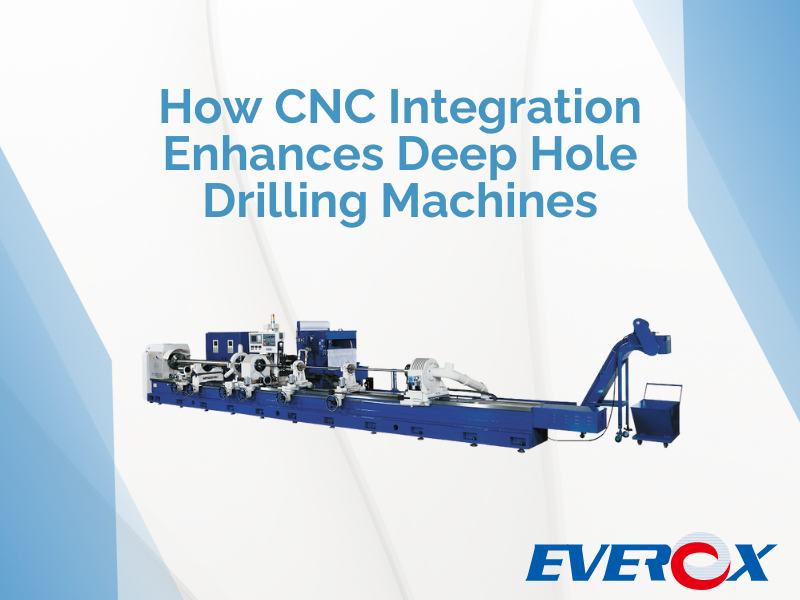How CNC Integration Enhances Deep Hole Drilling Machines

From Conventional to CNC: A Manufacturing Shift
For decades, deep hole drilling was regarded as a highly skilled and somewhat specialized process. Operators depended on manual adjustments to balance spindle speeds, feed rates, and coolant flow. While capable of producing functional results, this approach often led to variation between batches and placed heavy reliance on operator expertise.
The arrival of Computer Numerical Control (CNC) has reshaped this process entirely. By embedding programmable automation and digital monitoring into deep hole drilling machines, manufacturers now achieve repeatable, precise, and high-throughput results with less dependence on manual intervention. This transition has not only streamlined production but also opened the door to new levels of complexity and reliability.
Precision in Every Cut
Deep hole drilling is unique because of its long tool engagement and the need to evacuate chips from extreme depths. Without advanced control, small variations in speed or temperature can create significant dimensional errors. CNC systems counter these risks by:
- Adaptive Feed and Speed Control: Modern CNC controllers adjust parameters dynamically based on spindle load, ensuring smooth chip evacuation and stable cutting conditions.
- Closed-Loop Feedback: Sensors feed real-time data into the control system, which instantly compensates for deflection, vibration, or unexpected tool wear.
- Thermal Stability Algorithms: CNC software corrects for temperature-induced changes in tool length or material expansion, preserving hole straightness and surface finish.
Together, these features transform deep hole drilling from a sensitive process into a highly predictable operation suitable for critical industries.
Productivity Gains Through Automation
Beyond accuracy, CNC integration is synonymous with productivity. Machines equipped with CNC control achieve:
- Reduced Setup Times: Once programmed, cycles can be repeated with minimal adjustment, saving hours compared to manual setups.
- 24/7 Operation: With robotic loaders or pallet systems, CNC deep hole drilling machines run lights-out manufacturing, producing components continuously.
- Multi-Process Capability: Advanced CNC models allow combined operations—such as counterboring, threading, or tapping—without moving the workpiece to another station.
These advantages are particularly valuable in oil & gas production, where drilling equipment often requires multiple long bores in heavy components, and in aerospace manufacturing, where batch production must meet tight delivery schedules.
Enabling Complex Geometries
Traditionally, deep hole drilling meant simple straight holes. CNC changes that paradigm by enabling multi-axis control. Machines can now execute:
- Angular Holes: For hydraulic manifolds and fuel systems requiring fluid paths at precise angles.
- Intersecting Channels: Common in cooling circuits of injection molds, where channels must meet with high precision.
- Variable Depth and Step Drilling: CNC allows complex drilling patterns in a single setup.
This flexibility reduces secondary machining, shortens lead times, and increases design possibilities for engineers.
Smarter Manufacturing with Data Integration
CNC controllers are not only about tool paths—they are gateways to smart manufacturing. By connecting to factory networks, a deep hole drilling machine becomes a data-rich asset that supports:
- Production Monitoring: Real-time dashboards track spindle hours, coolant flow, and feed rates.
- Predictive Maintenance: Historical data on vibration or torque helps predict when a tool or spindle needs servicing, reducing unplanned downtime.
- Traceability: Each drilled hole can be linked to recorded process parameters, an important factor for aerospace and defense compliance.
This integration makes deep hole drilling part of a connected ecosystem, contributing to leaner, more efficient production systems.
Deep Hole Drilling at EVEROX: Precision Meets CNC Control
At EVEROX, CNC integration is at the heart of our deep hole drilling solutions. Our EXL series excels in small-diameter precision drilling, while the ELA and ELB series handle large-diameter and ultra-deep bores up to 11,000 mm. Each machine is built on rigid cast-iron structures for vibration resistance and equipped with high-pressure coolant systems to guarantee efficient chip evacuation.
By combining BTA and gun drilling technologies with advanced CNC control, EVEROX machines deliver both flexibility and reliability. Industries ranging from aerospace and automotive to oil & gas and mold making rely on EVEROX to produce critical components with confidence.
➤ Learn more here: EVEROX Deep Hole Drilling Machines
Conclusion: The CNC Advantage
CNC technology has transformed deep hole drilling machines from specialized equipment into essential, future-ready assets. They now offer unparalleled precision, productivity, and connectivity, enabling manufacturers to meet growing demands for complex and high-volume components.
As industries push toward automation and digital integration, CNC-enhanced deep hole drilling represents more than a technical improvement—it is a competitive advantage.
✉ Contact EVEROX today to explore how our CNC deep hole drilling machines can strengthen your production capabilities and prepare your factory for the future.